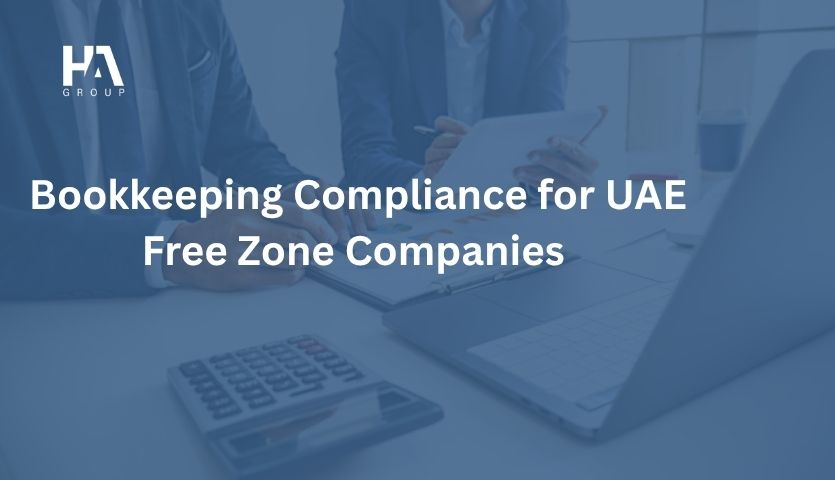If you’re running a company in one of the UAE’s free zones, you’ve probably heard that bookkeeping and accounting can be tricky. The reality is: bookkeeping compliance for UAE free zone companies is not optional — it’s a legal and financial necessity. And as rules tighten in 2025, staying compliant means more than balancing spreadsheets; it’s about protecting your business licence, tax benefits, and corporate bank account access.
Why bookkeeping compliance matters for free-zone companies
Bookkeeping isn’t just about good record-keeping. For a free-zone company, it’s a legal backbone. It ensures that:
- You meet requirements under the UAE’s primary commercial companies legislation — Federal Decree-Law No. 32 of 2021 on Commercial Companies (which replaced the 2015 law as of 2 January 2022) — and your respective free-zone authority.
- You remain compliant with VAT and corporate tax regimes.
- You maintain eligibility for free-zone benefits, such as the 0 % corporate tax rate for “qualifying” entities.
- You build trust with UAE banks, which increasingly demand up-to-date financials for corporate accounts.
As Gulf News recently highlighted, even free-zone companies that claim tax exemptions must maintain accurate, separate financial records to prove their qualifying status.
What “bookkeeping compliance for UAE free zone companies” actually means

1. Maintain proper books of accounts
All UAE companies — including free-zone ones — are required to maintain accurate financial records: income, expenses, assets, liabilities, and equity movements.
As per top publications reports, free-zone entities must register for corporate tax and maintain auditable records, even if they expect to remain at 0 %.
You must keep supporting documents such as invoices, receipts, and bank statements, typically for a minimum of five years (and seven for tax-related matters).
2. Prepare annual financial statements (IFRS-compliant)
Your financial statements — including balance sheet, income statement, and cash flow — should follow IFRS or another accepted standard.
Even if audit isn’t mandatory in your free zone, proper bookkeeping and IFRS-aligned statements help with corporate bank account management and tax audits.
3. Free-zone audit and filing
- Many free-zone authorities now require annual audited financial statements to renew licences.
- For example, Dubai Multi Commodities Centre (DMCC) and JAFZA have strict annual filing deadlines and approved auditor lists.
- Non-submission can result in fines, licence suspension, or loss of “qualifying free zone person” (QFZP) status under the UAE’s Corporate Tax Law.
4. VAT and Corporate Tax record-keeping
According to the Federal Tax Authority (FTA), taxable persons — including free-zone companies — must keep accounting records and documents such as invoices, credit notes, and import/export proofs for at least five years.
With corporate tax now fully implemented, bookkeeping also determines whether your free-zone company qualifies for the 0 % rate. To retain this benefit, you must demonstrate substance in the UAE and maintain audited financials, as confirmed by the Ministry of Finance’s Corporate Tax guidelines (Cabinet Decision No. 55 of 2023).
5. Banking compliance and documentation
Every free-zone company that opens a UAE corporate bank account is required to submit audited financial statements, business activity proofs, and transaction logs when requested.
Banks like Emirates NBD and Mashreq now cross-verify company ledgers with bank inflows to ensure compliance with Central Bank anti-money-laundering regulations. Unreconciled accounts or incomplete books can result in frozen or closed corporate accounts.
Common bookkeeping pain-points (and how HA Group solves them)
| Pain-Point | What Goes Wrong | How HA Group Fixes It |
| Poor documentation | Missing invoices, receipts, or unclear ledgers create audit risks. | Set up digital record-keeping and cloud-based accounting systems from day one. |
| Bank reconciliation delays | Mismatched statements make audits and VAT filings difficult. | Monthly reconciliations with real-time bank feeds. |
| Unawareness of audit deadlines | Some clients don’t realise their free-zone requires annual audits. | We maintain a compliance calendar and notify clients of due dates. |
| Tax qualification loss | Poor bookkeeping leads to loss of 0 % tax status. | Align bookkeeping with corporate tax filings and substance rules. |
Free-zone specifics worth noting
Each UAE free zone — such as DMCC, IFZA, RAKEZ, and SHAMS — may add its own compliance layer.
For example:
- DMCC requires all members to file audited financial statements within 90 days of year-end.
- IFZA allows flexibility but still expects annual financial reports for renewals.
- RAKEZ mandates audits for companies with specific business activities or revenue thresholds.
The UAE Ministry of Economy also outlines general company-law obligations that apply across both mainland and free-zone businesses, reinforcing that accurate record-keeping and timely financial reporting are legal duties — not optional best practices.
Checklist: Bookkeeping Compliance for UAE Free-Zone Companies
- Maintain full ledgers and supporting documents for 5–7 years.
- Prepare annual IFRS-compliant financial statements.
- Conduct bank reconciliation monthly.
- Appoint an approved auditor if your free-zone requires one.
- File audited statements on time to avoid penalties.
- Align bookkeeping with VAT and corporate tax filings.
- Keep substance documentation to retain your 0 % tax rate.
- Monitor updates from your free-zone authority and the FTA.
FAQ
Q1: Is bookkeeping mandatory for all free-zone companies?
Yes. UAE Federal Law requires all businesses to maintain accounting records, regardless of size or activity.
Q2: How long must I retain accounting records?
At least five years, or seven for tax-related documents.
Q3: Do all free-zone companies need audited financials?
No, but most major zones (DMCC, JAFZA, RAKEZ) now require annual audits for renewals.
Q4: Can poor bookkeeping affect my corporate bank account?
Absolutely. Banks regularly review company financials for compliance; poor record-keeping can trigger red flags or account suspension.
Final Thoughts
As UAE’s business landscape matures, bookkeeping compliance for free-zone companies has evolved from a mere formality to a regulatory and banking necessity.
For entrepreneurs, founders, and CFOs, this is the era of transparency — where every invoice, ledger, and audit matters.
At HA Group, we specialise in accounting and bookkeeping for UAE free-zone businesses. Our experts help you stay fully compliant with free-zone, tax, and banking regulations — so your business remains protected, audit-ready, and future-proof.
Contact HA Group today to book a consultation or compliance audit for your free-zone company.
Recommended Articles:
Best Outsourced Accounting Firms in UAE
How Much Does VAT Registration Cost in UAE? A Definitive Guide for Businesses
Why Bookkeeping Is Important for Small Businesses in Dubai
Cost of Accounting Services for Startups in UAE – What You Should Really Expect in 2025!







